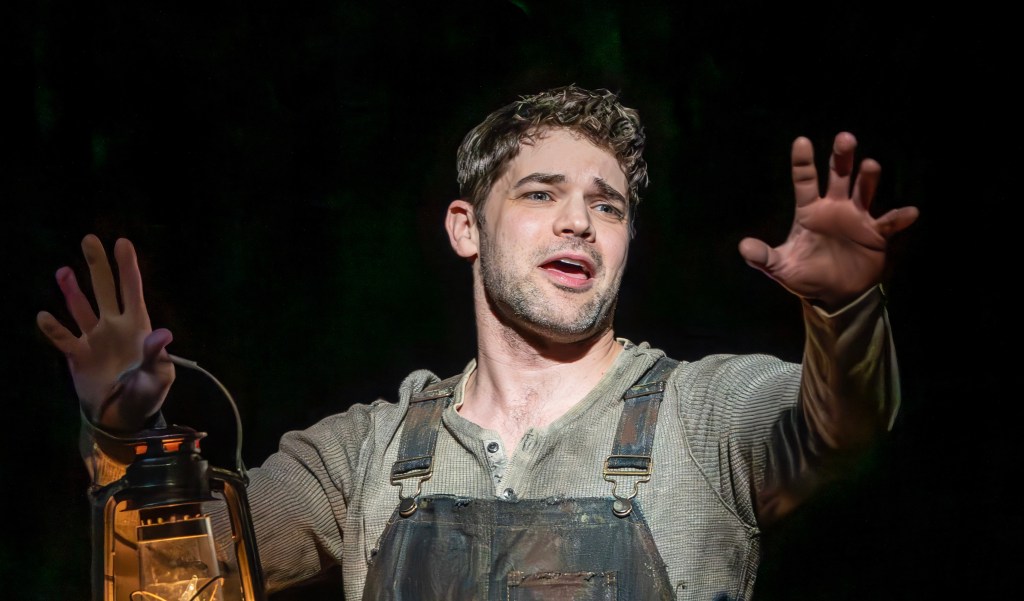In Lincoln Center Theater’s production of Floyd Collins, creators Tina Landau and Adam Guettel resurrect their touchstone project, the odd, sometimes slow but mostly beautiful musical they first conceived back in their days as Yale students and then brought it to life in a short-lived but legendary 1996 Off Broadway production. The new production, opening tonight at Broadway’s Vivian Beaumont Theater at Lincoln Center, leaves no doubt as to why those who first saw it nearly 30 years ago have been spreading its gospel ever since.
With Guettel’s often sublime score and lyrics that get at the terror, cynicism and, most of all, undying hope against hope well captured in Landau’s book, Floyd Collins might haunt some of those who see it now just as surely as it haunted so many back in ’96.
Notice, though, that I don’t say it will haunt everyone who sees it, and that’s simply because this musical is not without flaws, notably an overlong, repetitious book that can challenge patience, and a staging that scatters characters near and far on the massive Beaumont space. A musical tale as intimate as Floyd Collins would almost certainly benefit from a staging – and a stage – that reflects the small gem nature of its material.
Watch on Deadline
Still, no one can argue with the performances here, notably Jeremy Jordan, the popular Broadway singer from Newsies and The Great Gatsby, here giving the performance of his career. In command of a voice that is called upon to do so very much in the musical, from melodic and enchanting yodeling (and then yodeling in a duet with his own cave-echo voice) to the plaintive (“And She’d Have Blue Eyes”) and the joyous (“The Riddle Song,” “How Glory Goes”), Jordan’s rich, affecting voice is a marvel of versatility.
And, yes, there are joyous songs and moments in Floyd Collins, even if a quick description of the show might suggest otherwise. You might want to stop reading here to avoid the big, fat spoiler, but since the show is based on a well-known real-life event in 1925 that inspired an even more well-known movie (1951’s Ace In The Hole starring Kirk Douglas), the musical’s ending – Floyd dies – really should surprise no one.
Jordan plays Floyd Collins, a young man in 1925 Kentucky who would much rather explore the area’s many caves than work the “hardscrabble” farm land of his father. (Collins wasn’t alone – the area near Mammoth Cave in Kentucky experienced a downright craze in the ’20s as spelunkers searched the deep caverns as a get-rich-quick adventure: As Floyd dreams, find the right one, build some steps, stream some lights, add a concession stand and voila! money-making tourist attraction.
In the first 15 minutes of the musical, brilliantly staged and performed in this production, Jordan appears alone on a all-black set with big, black, jagged cubes that rise up for him to climb, and then a tall, large monolith that he scales, working his way through its various openings and, finally sliding down.
Sings Jordan while exploring, showing us what’s in the soul of American Dream-chasing Floyd Collins:
“There ain’t never been another man in here/No Indians, no thrill seekers/No damn crazy cavin’ fools!/Nobody, nothin’ till I found her/God showed her to me first!”
But he also sings this:
“There’s a kind of awe/You can’t catch in a photograph/It’s like a giant jaw, it’s callin’ me”
Soon enough, the giant jaw bites down, and Floyd is trapped in a very narrow passage, rocks falling on his legs and then his arms, pinning him.
Above ground, family, friends and neighbors gather at the cave mouth where Floyd has left behind his jacket and other items. They initially take the news in stride, since Floyd has gotten himself in jams before and always manages to wriggle out. But as one nightfall passes, and then another, they realize this time’s different. Floyd, with his portrayer Jordan confined to a slanted plank for most of the rest of the musical, isn’t coming up.
While his brother Homer Collins (Jason Gotay) can at first get his body only far enough to hear his brother, a cub newspaper reporter newly on the scene named Skeets Miller – the nickname short for Mosquito, because of his slight build – is soon squeezing through the tight places and actually making contact. Miller (Taylor Trensch) is able to deliver food and water (Floyd’s hands come free, but not his legs) and begins a series of interviews with the trapped man to relay his plight to the world.
And the world listens. Suddenly (as in the real-life event and the subsequent movie) the sleepy Sand Cave in Barren County, Kentucky, becomes a tourist attraction, but not for the reasons Floyd had envisioned. People come not to explore the cave, but to watch and wait for a rescue, or perhaps a different result.
The first act of Floyd Collins focuses mostly on the Collins family: Floyd, of course, and brother Homer, father Lee (Marc Kudisch), stepmother Jane (Jessica Molaskey) and sister Nellie (Lizzy McAlpine), a sensitive Tennessee Williams-esque soul who has just been released from some sort of mental asylum. She and Floyd have had a lifelong bond, almost telepathic.
Act II changes the mood of the musical as the setting becomes one of carnival grotesqueries. The set, designed by the dots collective, now features carnival lights, fireworks, a game or two, even that concession stand that Floyd had planned. Of course, now the tourist site has a morbid gloom over it. The opening post-intermission number is “Is That Remarkable” sung by a trio of reporters, in black trench coats and fedoras, harmonizing as if they might be anticipating the Andrews Sisters. The vaudeville-style number (Jon Rua designed the charming dance sequences) has a gleefully ghoulish tone, even as it stirs up a musical that needs stirring.
The plot from there goes where it goes, with rescue attempts made and lost, blame for all and grief for some. There’s a lovely number called “The Dream” in which the supine Floyd rises and walks to find his family, friends and even Skeet the reporter, with whom he has developed a sweet relationship that is left open to interpretation, all dressed in white save the dusty, mud-covered man of the hour (Anita Yavich did the era-accurate costumes). It has been more than two weeks since he first became trapped.
Landau has assembled a fine cast to bring life to this sad tale, with Jordan leading the charge. Gotay, as the restless brother who, in his own way, is as trapped as Floyd, though not by rocks but by a father’s expectations, matches Jordan’s vocals every step of the way. Kudisch and Molaskey are very affecting as the distraught parents pushed to their limits, and Sean Allan Krill as the out-of-town big shot engineer who comes to save the day gives a insightful performance that begins with hubris, moves through genuine attachment and ends with, well, defeat.
Two performances also of note: Trensch as the cub reporter Skeets and McAlpine as the alternately optimistic and broken sister Nellie. Trensch fleshes out the reporter with flashes of fear, ambition, duty and, in the end, a love for Floyd that Landau hints very subtly has become something close to romantic. Every choice Landau makes with Trensch and McAlpine is the right one.
McAlpine, who has built a very successful career as an indie pop singer-songwriter, makes an impressive Broadway debut here, singing the bluegrass-infused number “Lucky” – one of the prettiest songs – in a crystalline mid-range that hints at Appalachian roots music while standing firm on the theater stage.
Guettel’s music, by and large, isn’t always easy on first listen. It is dreamy and unconventional – lacking melody is usually the first complaint – but here the score is infused with elements of country, blues and mountain music, giving it a homier feel. Bruce Coughlin’s orchestrations are superb.
Still, the score, and the production itself, can, and does, drag at times, particularly near the end, when, maybe with a bit of guilt, some audience members might wish a fast-forward to fate. Not to compare our endurance test to that of poor ol’ Floyd, but still, tighter tale-telling, less musical repetition and more intimate staging could send the estimable Floyd Collins soaring.
Title: Floyd CollinsVenue: Broadway’s Vivian Beaumont Theater at Lincoln CenterDirection, Book, Additional Lyrics: Tina LandauMusic & Lyrics by: Adam GuettelCast: Jeremy Jordan, Jason Gotay, Sean Allan Krill, Marc Kudisch, Lizzy McAlpine, Wade McCollum, Jessica Molaskey, Taylor Trensch, Cole Vaughan, Clyde Voce, and Kevin Bernard, Dwayne Cooper, Jeremy Davis, Charlie Franklin, Kristen Hahn, Happy McPartlin, Kevyn Morrow, Zak Resnick, Justin Showell and Colin Trudell. Running time: 2 hrs 35 min (with one intermission)
The post ‘Floyd Collins’ Broadway Review: Jeremy Jordan Gives Life To Dark Tale Unearthed From History appeared first on Deadline.




